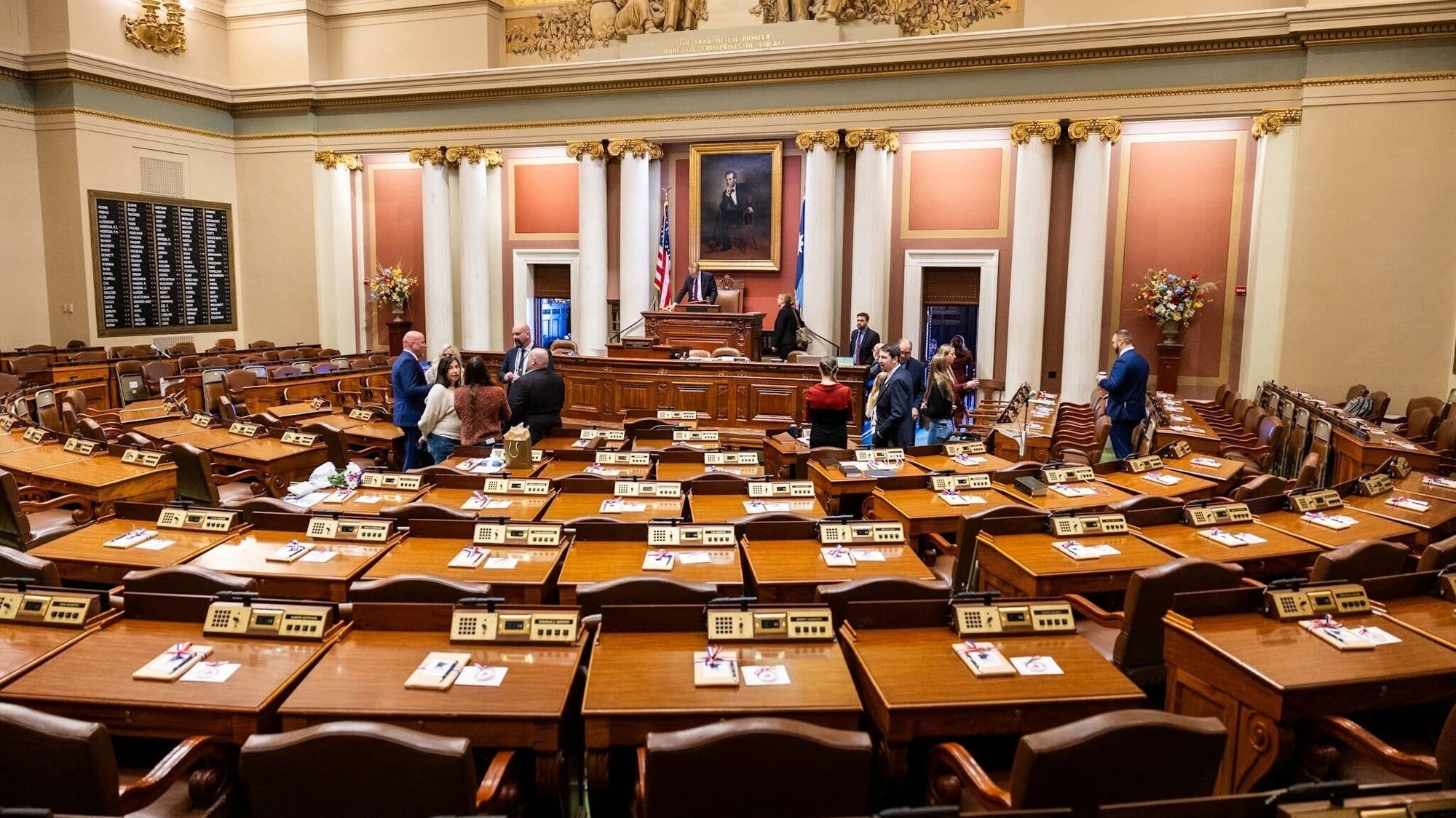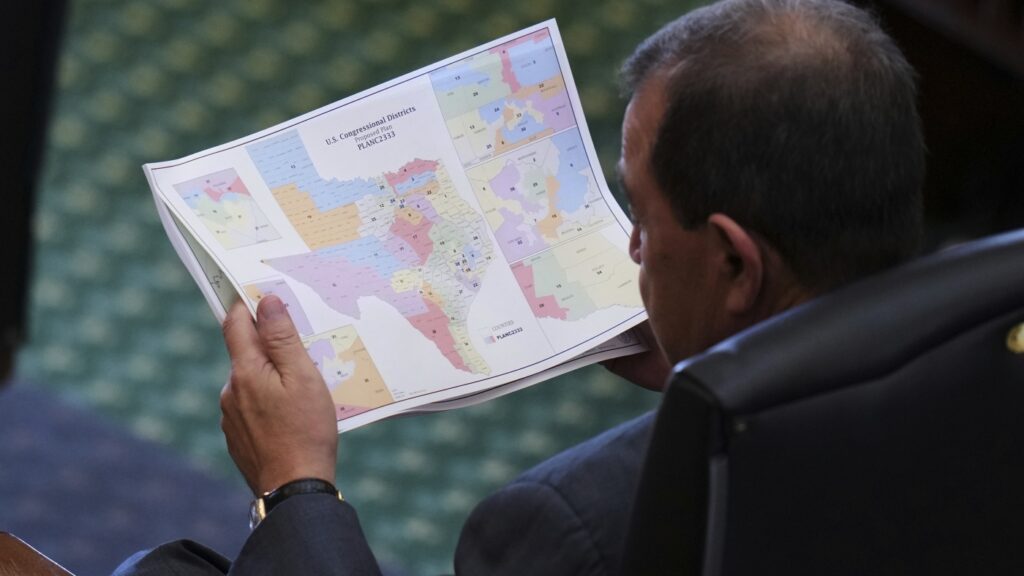Now Reading: Minnesota House DFLers boycott opening session in bid to halt chamber business
-
01
Minnesota House DFLers boycott opening session in bid to halt chamber business
Minnesota House DFLers boycott opening session in bid to halt chamber business

DFLers on Tuesday made good on their threat to keep the Minnesota House in limbo, boycotting the session’s opening as the parties fight over chamber control. House Republicans say they’re pushing ahead in the half-empty chamber. It’s not clear what come next.
House Democrats were no-shows as the Legislature convened at noon. Republicans there vowed to push forward with the session, but questions around whether they have the legal ability to do that haven’t been completely answered.
Cameras panned the House chamber — and the empty DFL side — just after noon as the roll call began. The clerk paused after calling the names of DFLers and getting no response. Republicans all vigorously checked in as “present” when their names in the roll call arrived.
GOP members were then sworn in. Appeals Court Chief Judge Jennifer Frisch administered the oath of office to Republicans, and a hearty round of applause followed.
MPR News helps you turn down the noise and build shared understanding. Turn up your support for this public resource and keep trusted journalism accessible to all.
‘No other recourse’
DFL leaders had signaled earlier in the day they intended to follow through on the boycott threat.
In a midmorning statement, Melissa Hortman, leader of the Democrats, said the DFL would not show up Tuesday at the Capitol, potentially denying a quorum in the chamber and preventing it from conducting business.
Hortman cited the GOP’s response to news of a judge concluding state Rep. Brad Tabke, a DFL Minnesota House incumbent who narrowly won reelection, should be able to begin a new term. House GOP Leader Lisa Demuth criticized the ruling and said her caucus would evaluate it and consider options.
Hortman in her statement said the DFL had no choice but to stop the House from conducting business.
“Given Republican statements this morning indicating their intent to ignore the election results and the court’s decision, Democrats have no other recourse to protect the will of the voters than to deny quorum until the special election in (House District) 40B has concluded and that new member is sworn in,” Hortman wrote.
District 40B is a crucial seat that came open after the November winner, a DFLer, was disqualified for failing to establish proper residency in time to serve the Roseville-Shoreview area district. It’s due to be filled in a Jan. 28 special election — that timing is also part of a pending court fight — and will determine if Republicans gain a true advantage or the chamber is tied at 67-67.
Hortman’s remarks signal that the deadlock at the outset of the Legislature’s five-month run will continue.

House Democratic Leader Melissa Hortman talks with members of the press at the Minnesota Capitol on Jan. 6.
Clay Masters | MPR News
House Democrats have threatened an indefinite boycott if Republicans move forward with an effort to assume key leadership positions on a temporary one-vote advantage that they’ll be able to retain for the year and maybe beyond.
It’s not fully clear what Republicans can do if DFLers skip out. They insist that 67 members is enough to constitute a quorum and suggest that they will ignore rulings to the contrary by the presiding officer at the session’s outset.
On Tuesday morning, a judge sided with Tabke, saying he should be able to start his new term as the winner of the election and that “neither an injunction nor a special election is warranted or ordered.”

House Republican Leader Lisa Demuth talks with members of the press at the Minnesota Capitol on Jan. 6.
Clay Masters | MPR News
With an indefinite boycott, it’s not clear when the House, at least, would start its work — and it has a lot of work to do this session.
Lawmakers must pass a two-year budget before July 1 or the state could face a government shutdown. They could also take up a public construction finance bill because they weren’t able to get one across the finish line last year.
They could also weigh a variety of policy bills and possible tweaks to Minnesota’s budding legal cannabis marketplace and paid family and medical leave program that is set to go live next year.
Lawmakers have to adjourn the legislative session on May 19, but they could be summoned back for a special session if they can’t get their work done on time.
Will Republicans elect a speaker?
Republicans have said they’ll move forward with an effort to elect GOP Leader Lisa Demuth, R-Cold Spring, as House speaker and put fellow Republicans in place as committee chairs.
“We are not at a tie right now, and the actions and the way that the Democrats have shown that they will not work with us, regardless of whether or not they like the circumstances, really brings into question how serious they were going to work with us all the way through on a power sharing (deal) or these antics that we’ve seen,” Demuth said earlier in the week.
Secretary of State Steve Simon, a Democrat, wrote to GOP leaders last week and said there need to be 68 votes in the chamber to do any formal business, what’s known as a quorum.
Republicans insist they have authority to act with 67 members. They said they’ll ignore Simon and accuse him of collaborating with members of his party to grind the House to a halt.
“It appears that other members of your political party will engage in lawless behavior to thwart the lawful organization of the Minnesota House,” the GOP leaders wrote Monday in a letter to Simon. “You need not make yourself an accomplice in their shameful effort.”
Simon responded on Monday and said his assessment had not changed. He said that without 68 members, the chamber would not be able to take up action on electing leaders or other motions.
What about the Senate?
Senate leaders announced on Sunday that they’d reached a deal to share power, at least early in the session. Republicans and Democrats will share custody of presiding officer posts and committee chair positions, with the exact rotation of gavels to be determined. They’ll have evenly split representation on committees.
As part of that deal, senators on Tuesday named Sen. Bobby Joe Champion, DFL-Minneapolis, and Sen. Jeremy Miller, R-Winona, as co-presidents of the Senate. The pair hugged following their selection.
Going into the session, Republicans and Democrats will be evenly split at 33-33 with no tiebreaker. A special election for a Minneapolis area seat will break the tie late this month. And the power-sharing deal could be reversed once one caucus gets a 34th member.
But top lawmakers said whatever procedural rules adopted early in session will stay in place for the remainder of the year.



















